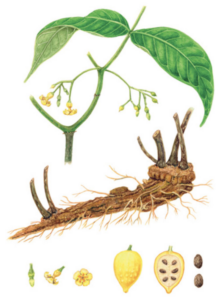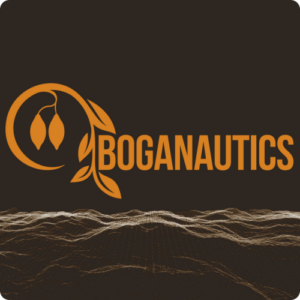Welcome to . . . Iboganautics: Unveiling the iboga experience for first-timers and shamans alike. I’m your host, A. M.
Podcast
Iboganautics is the podcast committed to discovering everything there is to know about “Tabernanthe iboga,” or simply called iboga, a naturally occurring psychedelic plant from Gabon in western Central Africa. While other podcasters and content producers mainly focus on the addiction interruption properties of ibogaine, the main alkaloid in iboga, there is so much more to discuss, so much more one could and should know for a richer appreciation of the experience. For this reason, I invite members of the iboga community and other experts on the podcast to speak not just about addiction but about alternative topics pertaining to iboga-the-plant as well as the subjective experiences elicited by iboga.
After several transformative personal experiences in addition to my own academic research, I speak with people that have something educational and interesting to say about this substance/experience, directly or indirectly related; for example, from scholars in neuroscience, philosophy, psychology, anthropology, and botany to experienced staff at retreat centers, artists, lay experts, and so on. While there’s much good information about iboga across multiple media, I believe there’s more to discover by conversing with said experts.
Listener
A couple of friends voiced concerns that producing a podcast exclusively about iboga is too niche. I agree it’s niche, but to have reservations about its niche status is a miscalculation. I don’t want to be knowledgeable about all psychedelics; there are too many. I prefer to zero in on the psychedelic tool/vehicle that interests me and then expand outward. Imagine an hourglass: sand falls through the narrow middle point, then, expands outward to form another pile below. Likewise, I have chosen a niche topic in order to expand my listeners’ and I’s knowledge outward from that small point.
The ideal Iboganautics listener is someone like me, at one stage pre experience and “in research mode,” consuming as much information as possible to inform whether they want to partake in this kind of experience or not. For example, I worked with ayahuasca for the first time after 2-3 years of research and contemplation; my research on iboga didn’t last as long because there was less information about it, or put another way, there was quite a bit of content out there, however, most of it centered on and repeated a couple of core themes (e.g. addiction interruption; Bwiti culture).

I also welcome intermediate iboga users who want to brush up on their knowledge and experiential sense-making by tuning into topics, guests and their perspectives they had not heard before. Since the podcast is in English, you would correctly assume I’m catering to denizens of English-speaking countries together with speakers of English as a second language. I don’t know how many iboga shamans (known as “Nganga”), guides, and healers from other countries speak English, but this podcast is for them too. Shamans are wise in their ways, but assumedly they don’t know what Western scientists know about the mechanics of, for example, iboga neuroplasticity. They probably don’t know about iboga’s (neuro)physiological effects by means of EEG, ECG, fMRI, and other complicated equipment scientists use to peek inside the body. In fact, neither do I. My point is that this podcast is for first-timers and shamans alike and everyone in between. There is something to learn about iboga for everyone and all are welcome to tune in and participate.
Additionally, in consideration of the scope of topics we’ll discuss from all things iboga to philosophy of psychedelic experiences/consciousness and psychedelic technology, I believe people interested in decoding their substance of choice that is other-than-iboga will tune in as well, hopefully adding to the canon of future psychedelic literature and discourse in their unique ways.
Intention
The Iboganautics podcast allows you and I to engage with and deliberate iboga-related information, knowledge, and experiences, and provides an opportunity for guests to share their perspectives. I understand my role as a bridge or translator between listeners/users and guests. Why, you might ask.

I’m in both worlds: I ingest psychedelics and research them with an academic mindset. Listeners, including myself, get to hear about research, articles, books, points of view, perhaps for the first time or a more nuanced presentation, and people working with iboga-related topics can talk about their work/experiences in a casual setting. I’ll ask the questions you’d ask and likely some you wouldn’t, as long as the questions dig deeper, resulting in a more marbled understanding of iboga/psychedelic/non-ordinary states of consciousness. As well, meeting experts in the iboga community and acquainting myself with their work adds to my “grand why” or grand narrative, and my overall research goals.
Important Catch 22: There is a catch, however, underlining this entire project. On the one hand, I want to share information with others, for others to potentially help me in my iboga decoding project, for Iboganautics and my present and future research to be resources for first-time users, shamans, and academics that I didn’t have when I started out. On the other hand, I feel responsible to raise awareness of the challenges that face iboga. I realize that this podcast will likely raise awareness about it, and one could argue that creating more interest in iboga could accelerate its potential extinction since increases in global demand would also increase illegal poaching and black market activities.
But I’m an optimist. I believe that we can raise awareness AND at the same time be responsible and ethical, practice sustainability and conservationism, act in accordance with nature, and accordingly, iboga will thrive for us and future generations. Also, I admit to being somewhat selfish in what I’m aiming for; iboga mustn’t go extinct, otherwise I cannot study it. I believe one day there will be enough iboga for everyone who wants to experience it for whatever reason. That day is not here yet, therefore there are actions we can take right now to actualize such a vision.
How to help right now
I’m speaking directly to Westerners because many of you have the disposable income to not only buy iboga or travel to Gabon to participate in a ceremony, but also because you have more money than others, relatively speaking, to help preserve iboga by creating a sustainable system of production and consumption. If you have ever consumed iboga, or plan to take part in its amazing experience, then you have a responsibility to this rare and revered plant. There are two main ways to help: money and creativity.
First, donating money to charities such as Blessings of the Forest ensures people in Gabon have the means to plant and protect iboga trees, to fight for and speak on behalf of a vulnerable plant that has no voice. They are our “boots on the ground,” so to speak.
Second, get creative. Here are some ideas off the top of my head even though some may seem impractical. (1) Create iboga plantation programs in neighboring countries such as Cameroon or Republic of the Congo where iboga also grows. (2) Help plant, for example, Voacanga africana farms specifically for ibogaine extraction, the principal alkaloid that opioid addicts seek to get well. (3) Prevent people from getting on opioids in the first place who seek iboga as a last resort. Write to your elected government officials in your area, demanding stricter laws on prescribing and obtaining highly addictive pharmaceuticals. (4) Think of other effective ways to get people off of opioids that do not involve drugs. What socioeconomic and cultural factors can be addressed that currently contribute to these people’s addictions and how can we remedy said factors? (5) According to activist Yann Guignon of Blessings of the Forest, there is so little we know about iboga botany: why does it thrive in certain areas and not in others; why are some iboga plants psychoactive and others not? Scientific research can begin to answer these questions. Please conduct these studies if you’re a botanist or related plant scientist.
There are many ways to contribute to iboga sustainability, some more practical and easier than others. Discover your way how you too can make a positive impact.
Forthcoming seasons
At present, multiple seasons are planned for the Iboganautics podcast project. More episodes to be released. Until then, enjoy . . .
. . . and remember to Subscribe/Follow the podcast to get next season directly and easily into your feed. Thanks for listening and for your support.
Addendum
As much as I love podcasting, meeting different people from different fields, and having amazing chats, unfortunately, the Iboganautics podcast presently is on hold because of time constraints. I prefer to produce multiple episodes in a single season that share the same theme, rather than making one-off episodes, for example, each week or month. 14 seasons were planned, guests I wanted to invite, topics ranging broadly, and all pertaining to iboga. If time and resources permit, then I will reboot the podcast.
